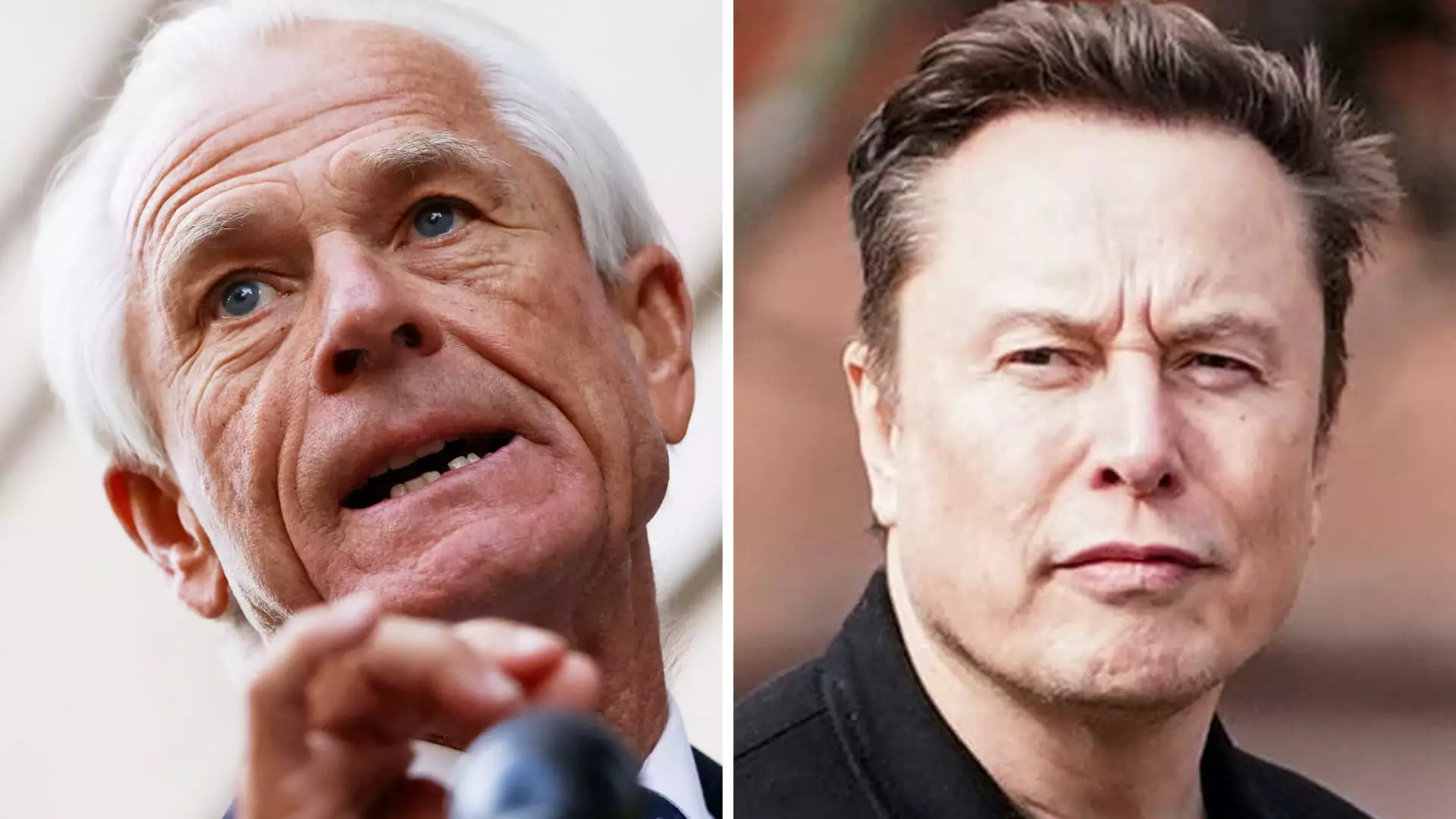In a recent media frenzy, the clash between Peter Navarro, a key White House trade adviser, and tech billionaire Elon Musk unveiled the often tumultuous and contradictory nature of policy-making within the Trump administration. Navarro, who has been a stalwart supporter of aggressive tariff strategies, found himself in the crosshairs of Musk, who openly ridiculed him as a “moron.” This public spat raises important questions not just about the personal dynamics at play, but also about the broader implications of their conflicting viewpoints on trade and manufacturing in America.
At the heart of this controversy lies a fundamental disagreement about what constitutes “American-made.” While Musk has positioned Tesla as the leader in domestic car production, Navarro clings to traditional definitions rooted in the actual production processes. Navarro’s insistence that Tesla is simply a car assembler because of its reliance on parts sourced from abroad demonstrates a rigid view of manufacturing. This stance, while politically advantageous in appeasing the protectionist wing of the Trump base, overlooks the nuanced realities of global supply chains that modern companies navigate.
The Disconnect of Definitions
Navarro dismissed Musk’s claims of American manufacturing prowess, asserting that true manufacturing should involve more than just the assembly of imported parts. His call for making tires in Akron and engines in Flint nods to a nostalgic ideal of manufacturing that many Americans long for, yet fails to reckon with the complexities of modern industry. In an era when supply chains crisscross the globe, oversimplifying what it means to create and sell in America appears more akin to economic populism than practical policy.
Musk, on the other hand, seems to embody a forward-thinking ethos that recognizes the realities of globalization, where barriers to trade can stifle innovation and efficiency. His desire for a “zero tariff situation” with Europe underscores a willingness to engage in a competitive global marketplace, contrasting sharply with Navarro’s protectionist views. This philosophical divide is concerning, as it reflects a broader schism in the administration itself, one where competing ideologies can undermine cohesive and impactful policymaking.
The Political Theater
What makes this public feud particularly fascinating is not just its content but the manner in which it unfolds in the media. Musk’s sarcastic barbs are a refreshing, albeit crude, contribution to the political discourse that has often veered into the absurd. By labeling Navarro “dumber than a sack of bricks,” Musk captures the attention of the public in a way that traditional political rhetoric often fails to achieve. However, one must wonder whether this brand of communication dilutes serious discussions surrounding economic policy to mere spectacle, diverting attention away from genuine issues at stake.
Navarro, for his part, downplayed the tensions during his appearance on NBC’s “Meet the Press,” attempting to project an image of unity. However, this attempt seems more like a damage control exercise than a genuine reconciliation of differing views. His praise of Musk’s work against “waste, fraud, and abuse” in the government appears hollow when juxtaposed against the backdrop of their ideological clashing. It illustrates a classic case of political pragmatism overshadowing ideological coherence — a strategy where maintaining unity takes precedence over addressing fundamental disagreements.
Concealing the Bigger Picture
The broader implications of this public spat extend beyond personal grievances; they touch on the very fabric of America’s economic strategy in a time of global uncertainty. As trade tensions escalate and the world braces for potential economic repercussions, the divergence in vision between Navarro and Musk poses real questions about how the U.S. will navigate its role in an increasingly interconnected world.
Rather than fostering productive dialogue, personal tussles and name-calling may obscure the strategic conversations that need to happen. In a polarized atmosphere rife with misinformation and emotional responses, voices advocating for sensible, liberal, and balanced trade policies risk being drowned out by sensational headlines and social media frenzies. The real challenge lies in ensuring that this political theater does not derail the much-needed discussion on what an equitable and forward-looking trade framework should look like in the next decade and beyond. The stakes are simply too high for America to allow petty conflicts to define its future direction.



Leave a Reply